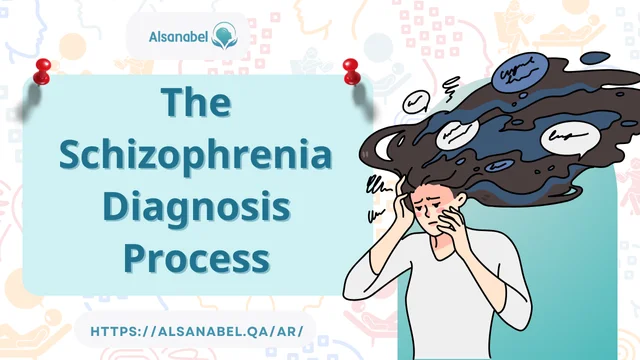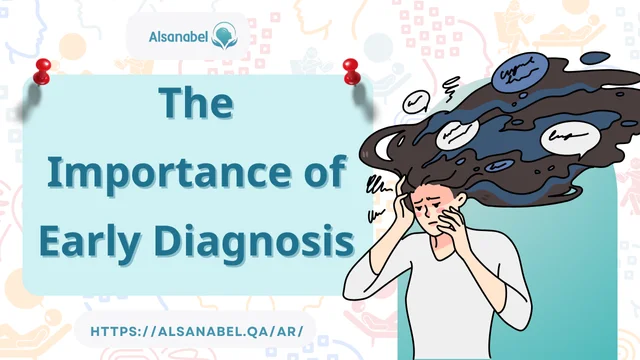
Schizophrenia is a complex and chronic mental health disorder that affects how individuals perceive reality, impacting their thoughts, emotions, and behavior. Early and accurate diagnosis is essential for effective treatment and management of the condition. The schizophrenia diagnosis process involves several steps, including psychological evaluations, medical assessments, and meeting specific criteria. In this article, we will explore the steps involved in diagnosing schizophrenia, the criteria used by mental health professionals, and the importance of early diagnosis, particularly for expats seeking mental health support in Qatar.
The Schizophrenia Diagnosis Process
The schizophrenia diagnosis process is not straightforward and often requires time and careful consideration. Schizophrenia shares symptoms with other mental health disorders, making it important to differentiate it from conditions such as bipolar disorder, depression with psychotic features, or substance-induced psychosis.

1. Initial Consultation
The first step in diagnosing schizophrenia typically begins with an initial consultation with a mental health professional. During this meeting, the professional will gather information about the patient’s medical history, family history, and symptoms. The patient may also be asked about any hallucinations, delusions, disorganized thinking, or negative symptoms like lack of motivation and emotional flatness.
2. Psychological Evaluation for Schizophrenia
A key part of the schizophrenia diagnosis is a psychological evaluation. This evaluation helps the psychiatrist or psychologist assess the patient’s mental state, emotional well-being, and cognitive functioning. It usually involves structured interviews and questionnaires designed to identify symptoms consistent with schizophrenia.
During the evaluation, the patient may be asked about:
- Hallucinations (hearing or seeing things that are not there)
- Delusions (false beliefs that are not grounded in reality)
- Disorganized thinking and speech
- Social withdrawal and lack of interest in daily activities
This assessment also involves observing the patient’s behavior and communication style to determine if there are any signs of thought disorder or abnormal emotional responses.
3. Criteria for Schizophrenia Diagnosis
To ensure accuracy, the diagnosis must meet specific criteria for schizophrenia diagnosis. Mental health professionals typically follow the Diagnostic and Statistical Manual of Mental Disorders (DSM-5) or the International Classification of Diseases (ICD-10) criteria. For a diagnosis of schizophrenia, the patient must exhibit at least two of the following symptoms for a significant portion of time over a one-month period:
- Delusions
- Hallucinations
- Disorganized speech
- Grossly disorganized or catatonic behavior
- Negative symptoms (e.g., diminished emotional expression or lack of motivation)
At least one of the symptoms must be delusions, hallucinations, or disorganized speech. Additionally, the symptoms should lead to significant impairment in social, occupational, or personal functioning.
4. Ruling Out Other Conditions
Diagnosing schizophrenia requires ruling out other potential causes for the symptoms. Mental health professionals conduct various tests to eliminate other conditions that may mimic schizophrenia, such as mood disorders, neurological conditions, or substance abuse disorders. This process often includes:
- Blood tests: These help rule out conditions like substance abuse or vitamin deficiencies that could be contributing to the symptoms.
- Brain imaging: In some cases, MRI or CT scans may be used to identify brain abnormalities or other conditions that could cause psychotic symptoms.
- Physical exams: A thorough physical exam ensures that there are no underlying medical issues contributing to the symptoms.
By ruling out these other conditions, mental health professionals can ensure a more accurate schizophrenia diagnosis.
5. Monitoring Over Time
Since schizophrenia develops gradually and can be difficult to diagnose based on a single evaluation, mental health professionals may need to observe the patient over time. Regular follow-ups and monitoring help professionals track changes in behavior and symptoms. This step is especially important for individuals who show early signs but do not yet meet the full diagnostic criteria.
Schizophrenia Diagnosis in Children
Can schizophrenia be diagnosed in children? Schizophrenia is rare in children, but it is possible. Early-onset schizophrenia (occurring before age 18) is less common than adult-onset schizophrenia and is often more challenging to diagnose because children may struggle to express their thoughts and feelings clearly. Additionally, some symptoms of schizophrenia in children, such as social withdrawal or academic difficulties, can be mistaken for other developmental disorders.
Pediatric mental health professionals are specially trained to identify schizophrenia in younger patients by carefully evaluating their symptoms and ruling out other developmental or psychiatric conditions.
The Importance of Early Diagnosis
Early diagnosis and treatment of schizophrenia at Al Sanabel Specialized Psychiatric Center In Qatar are crucial for improving long-term outcomes. Early intervention can help reduce the severity of symptoms, prevent complications, and improve the patient’s quality of life. It also allows individuals to access therapies and medications that can help manage the condition and promote better social and occupational functioning.

For expats living in Qatar, seeking expat mental health support in Qatar is essential if they suspect they or a loved one may be experiencing symptoms of schizophrenia. Mental health services in Qatar offer comprehensive assessments, psychological support, and treatment plans tailored to individuals with this condition.
Schizophrenia Diagnosis FAQs
1. How is schizophrenia diagnosed?
Schizophrenia is diagnosed through a combination of psychological evaluations, medical assessments, and ruling out other conditions. A mental health professional will assess the patient’s symptoms, medical history, and behavior to determine if they meet the criteria for schizophrenia.
2. What are the criteria for diagnosing schizophrenia?
The diagnosis of schizophrenia requires at least two of the following symptoms: delusions, hallucinations, disorganized speech, disorganized or catatonic behavior, or negative symptoms. These symptoms must be present for at least one month and cause significant impairment in daily functioning.
3. What tests are used to rule out other conditions when diagnosing schizophrenia?
To rule out other conditions, mental health professionals may conduct blood tests, brain imaging (such as MRI or CT scans), and physical exams to ensure there are no underlying medical issues or substance use contributing to the symptoms.
4. Can schizophrenia be diagnosed in children?
Yes, schizophrenia can be diagnosed in children, although it is rare. Early-onset schizophrenia typically appears before age 18, and diagnosing it requires careful evaluation by pediatric mental health professionals.
5. What is the importance of early diagnosis in schizophrenia?
Early diagnosis is critical for managing schizophrenia effectively. It allows for timely intervention with medications and therapy, which can reduce the severity of symptoms, improve functioning, and enhance the overall quality of life.
Schizophrenia diagnosis is a multi-step process that requires careful evaluation by mental health professionals. By understanding the criteria for schizophrenia diagnosis, the importance of ruling out other conditions, and the value of early intervention, individuals and families can seek the right support. For expats in Qatar, accessing expat mental health support in Qatar ensures that individuals facing mental health challenges receive comprehensive care tailored to their needs. Early diagnosis can make a significant difference in managing the disorder and improving outcomes for those affected by schizophrenia.
